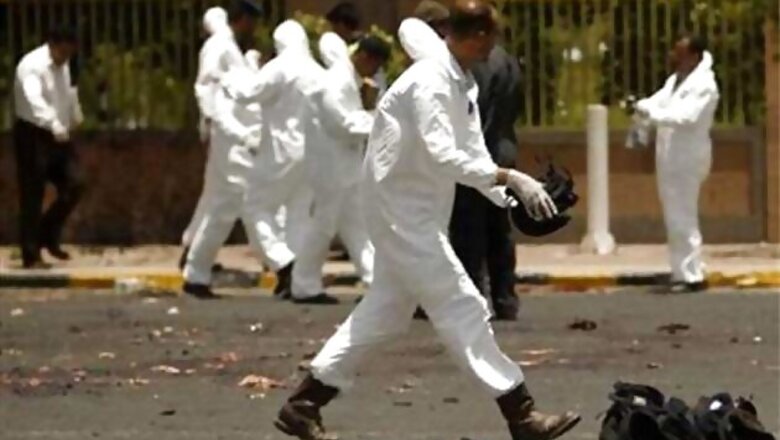
views
Sanaa: A suicide bomber in army uniform killed more than 90 soldiers in the heart of the Yemeni capital on Monday and an al Qaeda affiliate threatened more strikes if a US-backed campaign against militants in the front-line state did not stop.
The attack, which also wounded more than 200 people, underscored the threat Yemen faces in its fight to dislodge Islamist militants entrenched in the south and threatening vital shipping lanes in the Gulf of Aden and the Red Sea.
US President Barack Obama's counter-terrorism adviser, John Brennan, called Yemen's President Abd-Rabbu Mansour Hadi to convey Washington's condemnation of the attack and pledge support for Yemen, a main front in its global war on al Qaeda.
The explosion at a military parade rehearsal in Sanaa's Sabaeen Square left scenes of carnage, with body parts strewn across a 10-lane road not far from the presidential palace.
"We had just finished the parade. We were saluting our commander when a huge explosion went off," said soldier Amr Habib. "It was a gruesome attack. Many soldiers were killed and others had their arms and legs blown off."
Hadi, who took over after Washington and its Saudi-led Gulf Arab allies persuaded his predecessor to step down to prevent an uprising spreading anarchy in Saudi Arabia's neighbour, vowed to step up the fight against militant strongholds in the south.
"The war on terrorism will continue until it is uprooted and annihilated completely, regardless of the sacrifices," Hadi said, according to a text published by the state news agency.
The defence ministry said at least 90 soldiers were killed and 222 wounded in the attack. The al Qaeda affiliate said it had targeted the defence minister and army commanders.
Yemen's defence minister and chief of staff were both at the rehearsal for Tuesday's National Day parade -- meant to celebrate Yemeni unity - but neither was hurt.
Yemeni officials said Hadi decided to proceed with the parade, despite the attack, but moved it to a military academy.
Exploiting political turmoil resulting from months of protests that eventually toppled former president Ali Abdullah Saleh, the militants seized swathes territories in the southern province of Abyan.
Monday's attack, along with an ambush on Sunday on a US military training team, indicated their campaign could be entering a dangerous new stage in Yemen, which borders oil giant Saudi Arabia.
The United States is increasing its military support for Hadi's government and the US military has itself targeted militants in Yemen using drones, which have frequently killed civilians and are deeply resented by Yemenis, even the many who abhor al Qaeda.
A US military instructor was seriously wounded in Sunday's ambush, claimed by militant group Ansar al-Sharia (Partisans of Islamic Law), which is affiliated to al Qaeda in the Arabian Peninsula (AQAP).
The AQAP also claimed responsibility for the military parade suicide attack, saying it was in response to the "crimes" of the security forces in Abyan.
"We will take revenge, God willing, and the flames of war will reach you everywhere," it said.
Dressed in uniform
One investigator said preliminary findings suggested the suicide bomber was a rogue soldier who had somehow evaded security checks rather than a man in a disguise.
"The suicide bomber was dressed in a military uniform. He had a belt of explosives underneath," said a man who identified himself as Colonel Amin al-Alghabati, his hands and uniform flecked with blood.
The wounded were ferried to hospital in taxis.
"Most of the injuries are to the head, we have dozens paralysed. We expect the death toll to rise. Most of the injured here are boys in their teens. Sanaa's hospitals are overwhelmed," said doctor Mohsen al-Dhahari.
Tuesday's parade has been moved to a military college and the audience limited to civilian and military officials and diplomats, a government official told Reuters.
In response to the violence, Hadi sacked two senior commanders and allies of Saleh, whom he replaced in February. One of them, a nephew of Saleh, was the head of national security, an intelligence gathering unit that works closely with the CIA.
The army splintered into pro- and anti-Saleh camps during last year's revolt, hampering the campaign against militants.
"Hadi is serious about the confrontation, but he does not have a grip on the whole security apparatus, security services and the army in order to succeed," said Saeed Obaid, a Yemeni researcher of Islamist groups.
Monday's bombing was the most deadly in a spate of attacks in the impoverished state since Hadi took office saying he would extinguish an Islamist insurgency, which until now has been concentrated in the south. Analysts said it was hard to see how one man could have caused so many casualties.
"The scale of the carnage certainly raises many questions ... but this is clearly a major security breach and I suspect this attack took a long time to prepare," said Henry Wilkinson, head of analysis at the Risk Advisory Group consultancy.
Saudi intelligence services said earlier this month they had foiled a plot by al Qaeda's Yemen-based wing to arm a suicide bomber with an improved version of an "underwear bomb" of the type that failed to explode on a 2009 US-bound flight.
One analyst said the device used on Monday is unlikely to have been a version of the underwear bomb, which appears to be a comparatively small, high-tech device intended to cause a puncture in the body of an airliner.
Jeremy Binnie, Middle East/Africa editor of Jane's Defence Weekly, added that the high death toll on Monday may have been due to the bomber's position, and to the placing of a large amount of explosives in his suicide vest.
Binnie suggested that if the bomber was in among the men while they were lined up in ranks, and the ranks were not too huddled, that would have been the deadliest placement.
"While some people think that very busy areas are the best target, the first few bodies tend to absorb most of the blast and shrapnel," he said.
At least seven militants and seven soldiers were killed in clashes when Islamist fighters attacked an army position near the southern town of Zinjibar on Monday, residents and a local official said.
Yemeni troops closed in on the southern militant-held town of Jaar on Sunday in heavy fighting, part of a new US-backed offensive launched earlier this month to regain control of territory and towns seized by Ansar al-Sharia.
The parade was scheduled for Tuesday to mark the unification of north and south Yemen, previously separate states, which were merged in 1990.
















Comments
0 comment